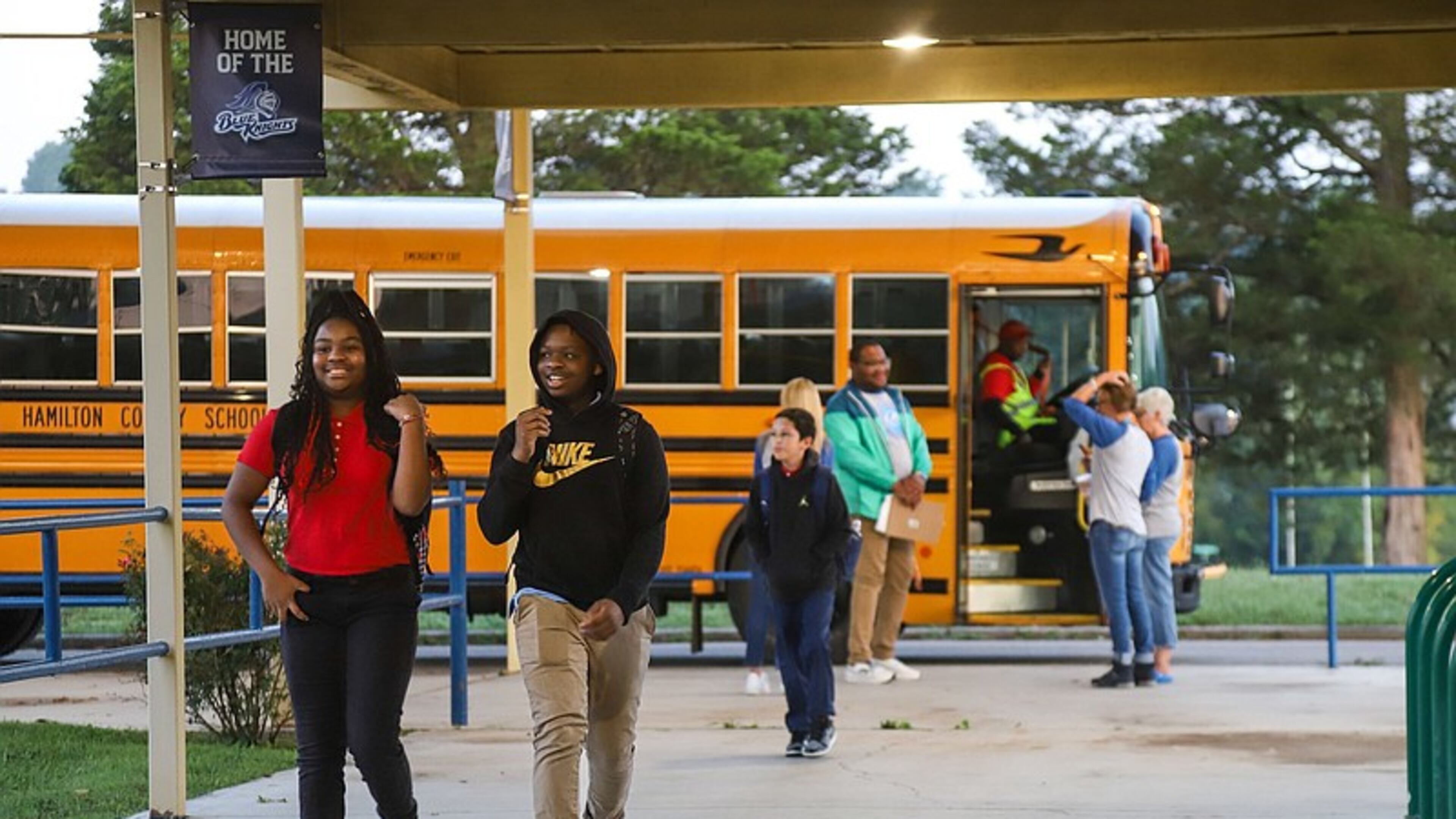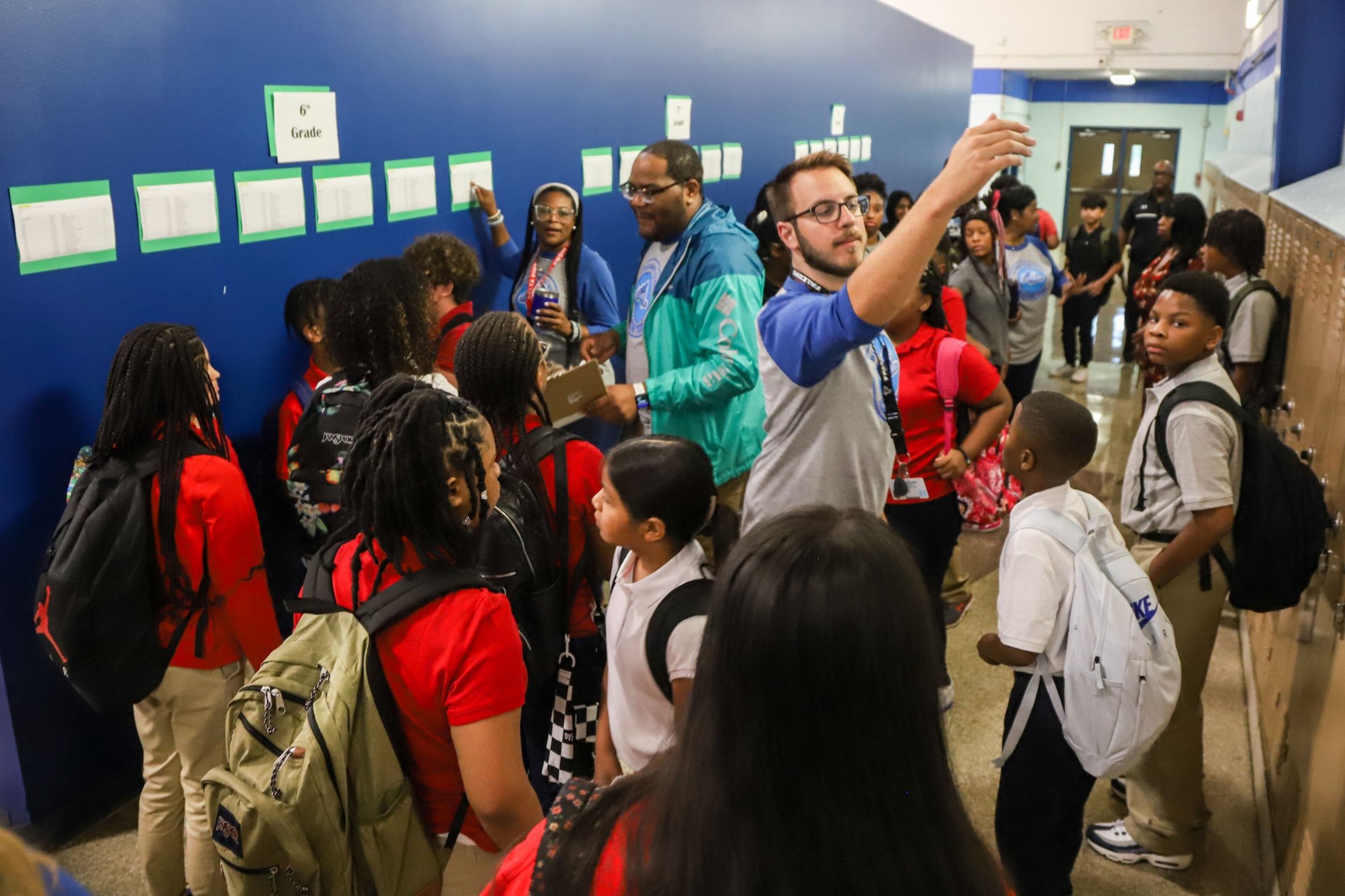Chattanooga-area students to get $150 to start investing for education after high school

This story was originally published by the Chattanooga Times Free Press.
About 13,500 Hamilton County students in kindergarten and middle school will receive $150 in a savings account to pursue education after high school.
Chattanooga 2.0, a nonprofit focused on literacy, early childhood development and improving career pathways, is partnering with several public and private entities on a five-year pilot program, which could ultimately serve about 38,500 students.
Keri Randolph, the executive director of Chattanooga 2.0, said she’s hopeful the Chattanooga Future Fund will break down an important psychological barrier for participating families.
“It’s not a ton of money when you’re talking about paying for college or paying for workforce training,” Randolph said in an interview. “But when families and students have these accounts from an early age, the research points to the fact that it builds hope and aspiration and belief.”
It also promotes early conversations about career planning after high school, Randolph said. Low income students with less than $500 in college savings are three times more likely to enroll in college and four times more likely to graduate than those with none, according to research from the Center for Social Development at Washington University in St. Louis.
The $150 could go towards college or other forms of workforce training. The program will begin with students enrolled in the 2024-2025 school year and will be available to children in kindergarten and sixth, seventh and eighth grades. It’s a one-time contribution that will be available to new kindergartners and sixth graders in future years of the pilot. The formal kickoff will be Jan. 23.
Business engagement
Organizers expect the pilot will cost about $7.5 million, a significant portion of which would come from private groups. The Benwood Foundation, the Maclellan Foundation, the BlueCross BlueShield of Tennessee Foundation, Pinnacle Bank, the Community Foundation of Greater Chattanooga and the Bobby Stone Foundation are among the donors.
Randolph anticipates the city of Chattanooga will provide $200,000 annually for five years, and officials expect Hamilton County leaders will consider funding for the program sometime in the future.
Once the system is set up, Randolph said, employers will have a way to invest directly in students, placing money in savings accounts at specific schools or for their employees’ kids.
“There’s a lot of room for business engagement,” she said.

All means all
Up to $150 will be available to all eligible students regardless of their family’s income.
“We felt that ‘all means all’ is actually important,” Randolph said. “Investing in every kid’s future is important.”
A family’s financial circumstances can also change, she said. Randolph compares the initiatives to the Dolly Parton Imagination Library, a program that mails free books to children from birth to five years old regardless of family income.
“All kids need opportunity,” she said.
Some people push back on the amount of money set aside, Randolph said, but even $150 can be a make-or-break expense for families.
The average ask from Chattanooga State Community College’s Helping Hands Fund, which is reserved for students facing financial emergencies, is about $300, Randolph said. Additionally, almost 40% of Americans can’t afford an unexpected expenses greater than $400, and about 20% have no emergency savings, according to the financial services company Empower.
“People live on the edge,” Randolph said. “You can imagine that for some students, depending on their circumstances, it could be a difference maker.”
More money
Hamilton County students from lower socio-economic households could also be able to receive more money in their college savings accounts.
Students in eight high-poverty middle schools can earn an extra $275 by completing financial literacy and career planning programs, according to organizers. Through the Tennessee Investments Preparing Scholars program, income eligible families can also receive a four-to-one match of up to $1,500 when they place money in the account.
Shelli King, a spokesperson for the Tennessee Department of Treasury, said families will be able to deposit the money they receive from the Chattanooga Future Fund into a TN stars College Savings 529 account, which offers them a way to save money for higher education. Investment earnings are tax free if they go to eligible expenses.
Families can also qualify for the four-to-one match if they meet income requirements based on the number of people in their household, she said in a phone call. For example, a family of four making less than $78,000 would qualify.
Ashley Nabors, assistant treasurer for financial empowerment, is hopeful the Chattanooga Future Fund will spur more families to participate in this state program.
Since it was established in 2014, there have been 1,179 participants and the state has provided $1.2 million grant funds. Recipients have in turn contributed $1.2 million, which indicates families are taking the intiative to set aside more money than the minimum requirement.
“This is planting the seed for savings,” Nabors said in a phone call.
Similar intiatives exist in California, Maine and Oklahoma, Randolph said. In San Francisco, officials open a savings account with $50 in public funds for every child entering kindergarten. Students participating in the program were 6% more likely overall to enroll in college. Enrollment also increased 12% among underrepresented students, which includes African Americans and Latinos.
Service
John Hawbaker, managing director of community relations with the BlueCross BlueShield of Tennessee Foundation, said the organization has been an active supporter of education for a long time.
When Chattanooga 2.0 reached out seeking assistance for its college savings account program, the foundation was eager to help, Hawbaker said. The group is providing $1 million for the initiatives.
“Our goal is to benefit all of the communities that we serve — not just the people that carry a BlueCross insurance card,” Hawbaker said in a phone call. “That corporate citizenship element matters.”
Higher educational attainment and income are both correlated with better health outcomes, Hawbaker said.
“If we can be part of helping more of our neighbors here in Chattanooga pursue their goals — earn a thriving wage in the future — that’s good for them, good for their families, good for the whole community,” Hawbaker said.
Craig Holley, Southeast Tennessee chair for Pinnacle Financial Partners, said the organization is making a “substantial financial contribution” and providing software for the future fund. In many cases, families participating in the program will have never opened a bank account before, and this will help them learn the value of saving early and watching their investment grow, he said.
“The single most important element contributing to our quality of life and economic development is the education of our young children,” Holley said in a phone call.
Industries evaluating whether to expand into Hamilton County always look at the quality of the local workforce, which is typically at the top of their priority list, Holley said.
“This thing could only help us as we try to grow and prosper,” he said.
Hope factor
Sonia Stewart, deputy superintendent for Hamilton County Schools, said the percentage of high school students who pursue post-secondary education is high, but the share who persist in those courses is often a bit lower.
There could be any number of reasons for that drop. Normal college adjustments like managing time, juggling tougher courses or homesickness could be factors, Stewart said, but students could also be struggling with financial hurdles.
“You encounter a bill you can’t pay and all of a sudden what’s right in front of you is not attainable,” Stewart said.
For lower income families, Stewart said, an unexpected expense as small as $200 can keep students from continuing their education after high school.
These types of savings accounts often increase the likelihood of students going to college and also help keep them enrolled, Stewart said.
“There’s a lot of research about how it changes the kids’ thinking about their future,” Stewart said. “It makes their future feel more attainable to them. It’s very little to do with the actual amount of money and more to do with that notion that their futures are attainable, that their dreams can be accomplished. It’s that hope factor.”
Additionally, researchers anticipate a growing number of careers will require some form of education after high school. By 2031, about 66% of “good jobs” will require a bachelor’s degree, according to research from Georgetown University. That’s compared to 59% in 2021.
“Good jobs” are those that pay a minimum of $43,000 to workers age 25-44 and $55,000 to workers age 45-64, according to the study. In 2021, about 19% of those jobs were available to people with just a high school education, although that could shrink to about 15% in 2031.
“One of our beliefs is that it’s the community’s responsibility to remove barriers for kids,” Stewart said. “I think this is a really excellent example … of what we would hope our community would do, where you’ve got public and private partnerships that are wrapping around kids and aspiring together about their future.”

MEET OUR PARTNER
Today’s story comes from our partner Chattanooga Times Free Press, which serves readers in Southeast Tennessee, Northwest Georgia and Northeast Alabama. Visit them at timesfreepress.com or on Twitter @TimesFreePress.
If you have any feedback or questions about our partnerships, you can contact Senior Manager of Partnerships Nicole Williams via email at nicole.williams@ajc.com.

